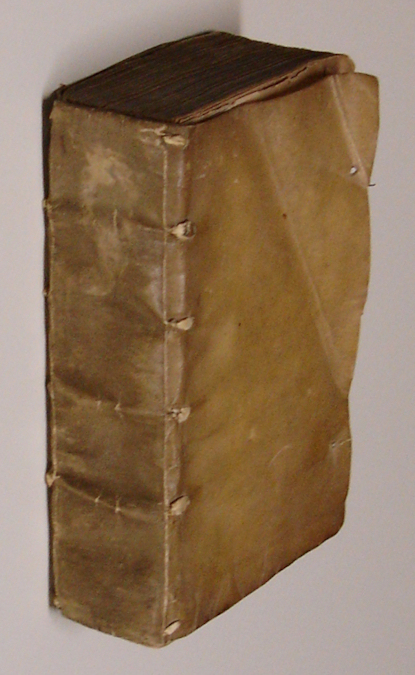FESTUS & M. VERRIUS FLACCUS. M. Verrii Flacci quae extant. Et Sex. Pompei Festi De verborum significatione libri XX. Cum vetusto Bibliothecae Farnesianae exemplari Romae nuper edito, collati; ex quo lacunae pene omnes sunt suppletae. In eos libros Ant. Augustini annotationes, ex editione Veneta, Io. Scaligeri castigationes recognitae, ex Parisiensi, Ful. Ursini notae, ex Romana. Accesserunt nunc denique doctissimorum virorum notae ex eorum scriptis hinc inde collectae.
Paris (Parisiis), Apud Arnoldum Sittart, 1584.
8vo (XXVIII),CCCIX,(1 blank),(22 index),(2 blank); LXXV,(1 blank),(10),CCXVI,(24 index),84 p. Limp vellum 17 cm (
Ref: Smitskamp 61; Schweiger 2,355 & 1134; Brunet 5,2 1148; Renouard-1926, n° 1044 (Renouard et alii, 'Imprimeurs et libraires parisiens du XVIe siècle', Paris, 1964)) (
Details: 5 thongs laced through the joints. Engraved printer's mark of Arnoldus Sittart on the title, his motto: 'Finis coronat opus', 'the end crowns the work'. (BaTyR : Base de Typographie de la Renaissance, no. 28409) The printer's mark shows the coat of arms of Cologne, the city where Arnoldus Sittart was born: the escutcheon bears 3 crowns and beneath them are twelve drops; the escutcheon is supported by a standing crowned griffin and idem lion; above the shield a helmet with peacock feathers as crest. (See for an explanation Wikipedia 'Kölner Wappen') (
Condition: The vellum is probably recycled from another book; that is why the cover is wrinkled, dog-eared, slighlty soiled, and cut short. A small piece of the outer-edge of the backcover has gone. Three names and a small inscription on the title, 1 name has been erased. Partly slightly waterstained at the lower margin. Some hardly visible pinpoint wormholes near the right lower corner of one quarter of the book) (
Note: Festus is a 2nd century grammarian, who produced an abbreviation of a lexicographic work by Marcus Verrius Flaccus, a wellknown antiquarian and grammarian living in Augustan Rome. Verrius compiled an enormous lexicon in 80 books, full of unusual, difficult, and archaic words, with discussions about customs, political institutions, beliefs and Roman law. Remains of his work survive in the epitome of 20 books made by Sextus Pompeius Festus. Festus also added examples found in other sources; an other epitome of this epitome of Festus was made in the 9th century by the historian Paulus Diaconus. The original work of Verrius is completely lost, and only 1 manuscript of Festus survived the Middle Ages in a heavily mutilated form. The first reliable text, which was a great improvement compared to earlier editions was published in 1559 by Antonio Agustin, 1517-1586, who made good use of the Farnese manuscript at Naples. He also added a commentary. It remained dominant for 2 centuries. Fulvius added in this edition suggestions concerning Greek material. J.J. Scaliger, 1540-1609, produced a highly acclaimed edition in 1575. He was praised for having successfully completed the gaps and damaged passages of the Farnese manuscript. Grafton says about this edition that 'fluency in conjecture and attention to detail could hardly be raised to a higher level'. (A. Grafton. Joseph Scaliger, a study in the history of classical scholarship, Oxf. 1983, vol. 1, p. 134/160) This edition of 1584 repeats Scaliger's of 1575. The text of Agustin is also printed, followed by 75 p. with his annotations, and followed by a 216 p. commentary by Scaliger; at the end we find the notes of Ursinus) (
Collation: +6, *8, a-x8, A-V8, X2, 2A-2E8, 2F2) (Photographs on request)
Book number: 120133 Euro 600.00
Keywords: (Oude Druk), (Rare Books), Festus, Lexikographie, Lexikon, Verrius Flaccus, lexicography, lexicon
 FESTUS & M. VERRIUS FLACCUS.
FESTUS & M. VERRIUS FLACCUS.

